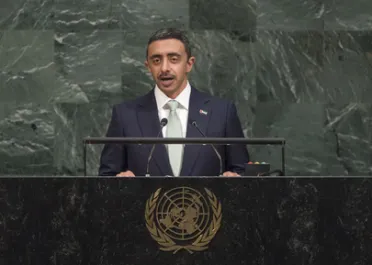Statement
Statement summary
SHEIKH ABDULLAH BIN ZAYED AL NAHYAN, Minister for Foreign Affairs and International Cooperation of the United Arab Emirates, said that his country worked hard and responsibly to promote the stability and development of Arab countries, as well as tackle the destruction that the region’s wars had left in their wake. The crises in that region had several causes: extremism and terrorism, interference by States in each other’s internal affairs, as well as aggressive and expansionist policies driven by hegemonic ambitions. While the international community had made progress in confronting humanitarian threats, more could be done to restore stability in the Arab world.
The development progress that had been made should be protected, otherwise conflicts in Libya, Syria, Yemen and Somalia would be managed instead of solved, he said. In those countries, stability could be restored, but only if outside interference in Arab affairs was stopped. A firm and sincere rejection of extremism and terrorism was also needed. The elimination of that threat from the Arab region was within reach. The liberation of ancient Arab cities such as Mosul in Iraq and Mukalla in Yemen from the grip of terrorist organizations was proof.
International efforts to achieve peace in the region would not be successful without ending the Israeli occupation of the Palestinian and Arab territories, which had lasted over seven decades, he said. That situation made young people vulnerable to exploitation by terrorist groups who claimed that they were the only choice through which they could achieve their aspirations. He also affirmed his country’s solid position and legitimate right to sovereignty over its three islands of Greater Tunb, Lesser Tunb and Abu Musa, which were occupied by Iran in violation of international law and the Charter. Two years had passed since Iran’s nuclear agreement, with no sign of change in its “hostile” behaviour in the region or any desire to abandon its nuclear ambitions. He supported enhancing controls on Iran’s nuclear programme and the continued assessment of the agreement and its provisions.

